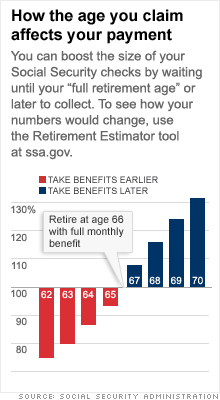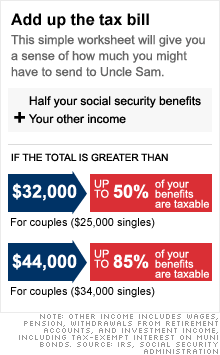What you need to know about Social Security
This benefit should be the cornerstone of your retirement planning. The answers to these five questions will help you to get the most out of it.


(Money Magazine) -- You've probably spent a lot of time sweating over your 401(k) and IRA. But have you given much thought to the way Social Security will fit into your retirement plans?
You should. In fact, Social Security provides 50% of the income for more than half of married retired couples and about 20% for high earners. Moreover, it's the only source of income you're likely to have that's guaranteed to last for life and keep pace with inflation.
But given the complexity of the Social Security calculations, it's tough to figure out how to make the most of it. The amount of your monthly check will depend on when you retire, how much you and your spouse earned, and whether you work in retirement. "That makes it hard to plan," says former Social Security Administration deputy commissioner Andrew Biggs. The following guide will answer those questions and give you strategies that can help you maximize your benefits.
QUESTION 1: Can I count on Social Security to be there?
You can. Despite what you may hear about the system going broke, the funds from workers' payroll taxes will cover all retirees' payments until 2016 even if no changes are made to the current program. After that the Social Security Administration can cover full benefits until 2037 by cashing in its Treasury bonds from the Social Security trust fund. And when the bonds run out, income from payroll taxes would be enough to cover about 75% of payments for decades.
That said, the government is looking at ways to shore up the system. President Obama has talked about imposing Social Security payroll taxes on income over $200,000 (currently, earnings over $106,800 are exempt). Other possible fixes: upping payroll taxes, raising the retirement age, and scaling back payments in some way.
The good news for anyone in or near retirement: "People 55 and over are likely to see no change or just a marginal change in benefits," says actuary Bruce Schobel, who worked on the commission headed by Alan Greenspan nearly 30 years ago that fixed the system (at least until now). But even younger workers can rest assured that drastic cuts are unlikely.
QUESTION 2: How much will I get every month?
Like all things Social Security, there's a complex formula involved. But essentially, the amount you'll get at your full retirement age is based on your average lifetime earnings, adjusted for rising wage levels over the years. Depending on when you were born, your full retirement age varies between 65 and 67. Grab your payments earlier than your full retirement age, and they'll be reduced: Wait, and you'll get more.
Spouses can also qualify for up to 50% of their husband or wife's full retirement age payment; if that amount is larger than what you would get based on your own earnings, you'll get the higher figure. Similarly, if your spouse dies, you would receive a survivor's benefit of up to 100% of what your deceased spouse was collecting, if that amount is higher than your own payment. Divorced? You may still be eligible for spouse and survivor benefits as well.
Your checks are also automatically adjusted for inflation each January. Payments increased by 5.8% for 2009. But given the near-term inflation outlook, the Congressional Budget Office estimates there may not be a cost of living increase for the next few years.
QUESTION 3: At what age should I begin collecting?
The majority of people take Social Security before full retirement age. But it often pays to wait. Just in terms of benefits accrued, if you have an average life expectancy or better, you'd probably come out ahead waiting for a larger payment that you won't collect as long. More important, you'll have a bigger check at an age when your retirement savings are diminished and you aren't likely to be able to work to supplement your income.
The math gets more complicated for married couples, however, since in addition to what they get from their own earnings, one of them may also qualify for spousal benefits and eventually collect payments as a surviving spouse. So married couples should aim to max out their benefits over both their lifetimes.
Generally, the best strategy is for the higher-earning spouse to delay taking Social Security for as long as possible. That's because survivor benefits are based on the larger of the couple's checks. The lower-earner, meanwhile, should usually claim benefits earlier. That will often, though not always, provide the greatest amount of income as well as security in old age.
QUESTION 4: Will I lose benefits if I work?
It's true that if you collect early and work at the same time, your payments may be reduced (once you reach full retirement age, feel free to toil away; your golf game might suffer, but there's no effect on your Social Security). Your checks will be reduced by $1 for every $2 you earn over an annual limit, currently $14,160 (the hit is considerably less during the calendar year you hit full retirement age).
But despite what you often read or hear, you don't actually "lose" that money. At full retirement age Social Security will begin compensating you with a larger check for the benefits that were withheld. And you'll receive that higher payment for the rest of your life. If you are reasonably long-lived, you'll wind up collecting more -- and you'll have extra income from your additional years as a wage slave.
Working in retirement can also up your payments in other ways. Your check is based on your 35 highest years of wages. If you work fewer during your career, your benefit will be adjusted to reflect any extra years of work. Even if you clocked all 35 years pre-retirement, you could still get a bump if your annual earnings during your golden years were higher than some years earlier in your career.
QUESTION 5: Will my benefits be taxed?
You thought Uncle Sam would cut you a break after retirement? Fat chance. Currently, about a third of Social Security recipients pay income tax on a portion of their benefits, and the Social Security Administration projects upwards of 42% of recipients will be doing so by 2018.
To see whether you'll owe taxes and, if so, to estimate what the bill might be, use our simplified worksheet ("Add up the tax bill," above, right) or fill out the extremely detailed one in IRS Publication 915: Social Security and Equivalent Railroad Retirement Benefits, available at irs.gov.
If you want to lessen the tax bite, there are a couple of options. One is to wait at least until full retirement age to claim Social Security, if you think that income from a post-retirement job could result in a big tax bill.
Another way to avoid taxes is to pull money from a Roth IRA instead of a traditional IRA or 401(k). That's because Roth withdrawals don't count as income in figuring whether your benefits are taxable. So if you don't already have money in a Roth, you may want to fund one or convert some of your traditional IRA to a Roth. After all, in retirement, you're likely to need all the cash you can get. ![]()


